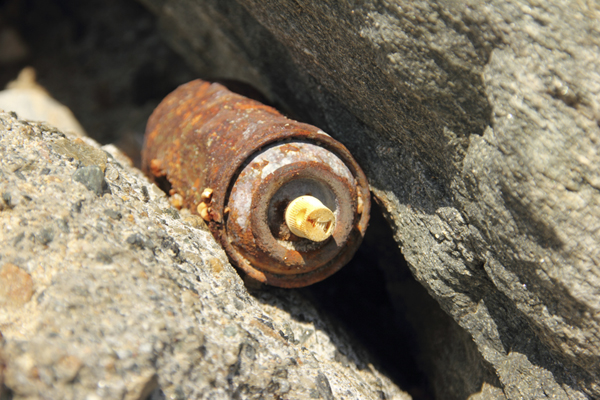Written on: April 1, 2021 by W. Stephen Tait
Hello everyone. I’m often asked how spray packaging corrosion begins. There are multiple types of corrosion and each begins differently. Consequently, a comprehensive and often nuanced discussion on how corrosion begins is beyond Corrosion Corner’s scope. However, I’ll do my best to provide a succinct overview on how spray package corrosion begins.
Corrosion Basics: Spray package materials
Aluminum, tinplated steel (ETP) and tin-free-steel (TFS) are used to fabricate spray packages and the internal bags used in spray packages. These metals can be either bare metal (not common with aluminum and TFS) or covered with either a polymer coating or a polymer film laminated to sheet metal or metal foil. Hence, spray package corrosion could be metal corrosion, polymer corrosion or both.
For the sake of simplicity, I’ll refer to both polymer coatings and laminated polymer films as polymers.

Corrosion Basics: Spray package surfaces
The condition of a surface is a main factor to determine if corrosion occurs and how fast it will corrode the surface materials.
Aluminum containers and foils for internal bags are typically coated with a polymer. The surface of aluminum is a complex mixture of grains, grain boundaries, non-metallic inclusions, crystal orientations and crystal defects. Thus, polymers bond to a variety of materials on an aluminum surface, resulting in a variety of polymer-surface bonds, each having different corrosion resistance properties. There are also areas where polymers do not wet the surface, leaving small holes in the polymer.
The interaction between the chemical composition of your formula and polymer morphology determines what areas on a polymer are more or less corrosion-resistant.
Steel spray packages typically have either a thin metallic tin coating (called tinplate or ETP) or a thin metallic chromium/chromium oxide coating (called tin-free steel or TFS). Steel also has a complex surface structure to which the tin and chromium coatings bond.
Metallic coatings also cannot totally wet the substrate steel. For example, image analysis studies on 0.2-pound ETP (0.1 pound of tin on each side of a 31,360 in2 steel sheet) indicate that approximately 20% of the metallic coating surface has holes that either exposed steel or the iron-tin alloy (the ratio has not been determined).
Polymers are deposited on top of the thin metallic coatings. Hence, coated ETP also has a variety of surface-bonds with the polymer and the tin, iron-tin alloy, steel, various inclusions in the steel and small areas with no polymer. A similar situation exists for TFS.
First stages of aluminum corrosion
Diffusion of formula-water with formula ingredients through the polymer is a necessary first step for both polymer and metal corrosion. Metal corrosion under a polymer occurs when liquid accumulates on the metal surface, the diffusing liquid is corrosive and liquid diffusion through the coating is fast enough to sustain corrosion.
Aluminum is a soft metal and surface-indentations (or divots) often occur while packages are forged into their shape. The indentations can be either capped by, or filled with, the polymer. Capped indentations form cavities where liquid accumulates and liquid-filled cavities could initiate corrosion.
The interaction between polymer chemistry, polymer morphology and your formula’s chemical composition determine:
• The amount of polymer area where diffusion occurs;
• If very fast diffusion occurs in localized areas in the polymer;
• The diffusing liquid chemical composition;
• If the diffusing liquid is corrosive;
• What type of corrosion will occur; and
• How fast the corrosion degrades the package materials
First stages of ETP & TFS corrosion
Coated & uncoated
Steel containers without a polymer coating are referred to as “uncoated” or “unlined” containers—even though the “uncoated steel” has a thin metallic coating. Steel containers with a polymer are referred to as “coated” or “lined” containers. The first corrosion stages are different for coated and uncoated ETP. I will continue to refer to laminate films and polymer coatings as “polymers.”
Uncoated ETP and TFS corrosion could start with:
• Tin corrosion—commonly referred to as detinning
• Galvanic corrosion inside metallic coating holes between the substrate steel and the metallic coating
• Non-galvanic steel corrosion inside metallic coating holes
Steel pitting corrosion could also start with the dissolution of inclusions in the steel (non- metallic precipitates in the steel matrix). Pitting corrosion could also initiate after general corrosion covers the steel with a thin porous layer of iron oxide/hydroxide. Hence, holes in metallic coatings and galvanic corrosion are not always necessary to begin steel corrosion.
Coated ETP and TFS corrosion also begins with formula-water and formula ingredients diffusing through polymers. However, there are additional ways that substrate corrosion could start under polymers. For example, diffusion of water and formula ingredients through a polymer could cause detinning, forming an unattached area of polymer that is a cavity under the polymer. Polymers can also cap or fill holes in the metallic coatings. Holes in polymers also form when they do not wet either small areas on the metallic coating, or the polymer does not wet the metallic coating holes. Liquid accumulates under caps and inside holes and this accumulation could initiate corrosion.
The interaction between polymer chemistry, polymer morphology and your formula’s chemical composition determine:
• The amount of polymer area where diffusion occurs;
• If very fast diffusion occurs in localized areas in the polymer;
• The diffusing liquid chemical composition;
• If the diffusing liquid is corrosive;
• What type of corrosion will occur; and
• How fast the corrosion degrades the package materials
There are no available published tables or guidelines to help predetermine if corrosion will occur and how fast it will corrode polymers and spray package metals. Hence, corrosion testing with appropriate test parameters is needed to prevent surprise corrosion.
Thanks for your interest and I’ll see you in May. Contact me at (608) 831-2076, rustdr@pairodocspro.com or from one of our two websites: pairodocspro.com and aristartec.com. SPRAY